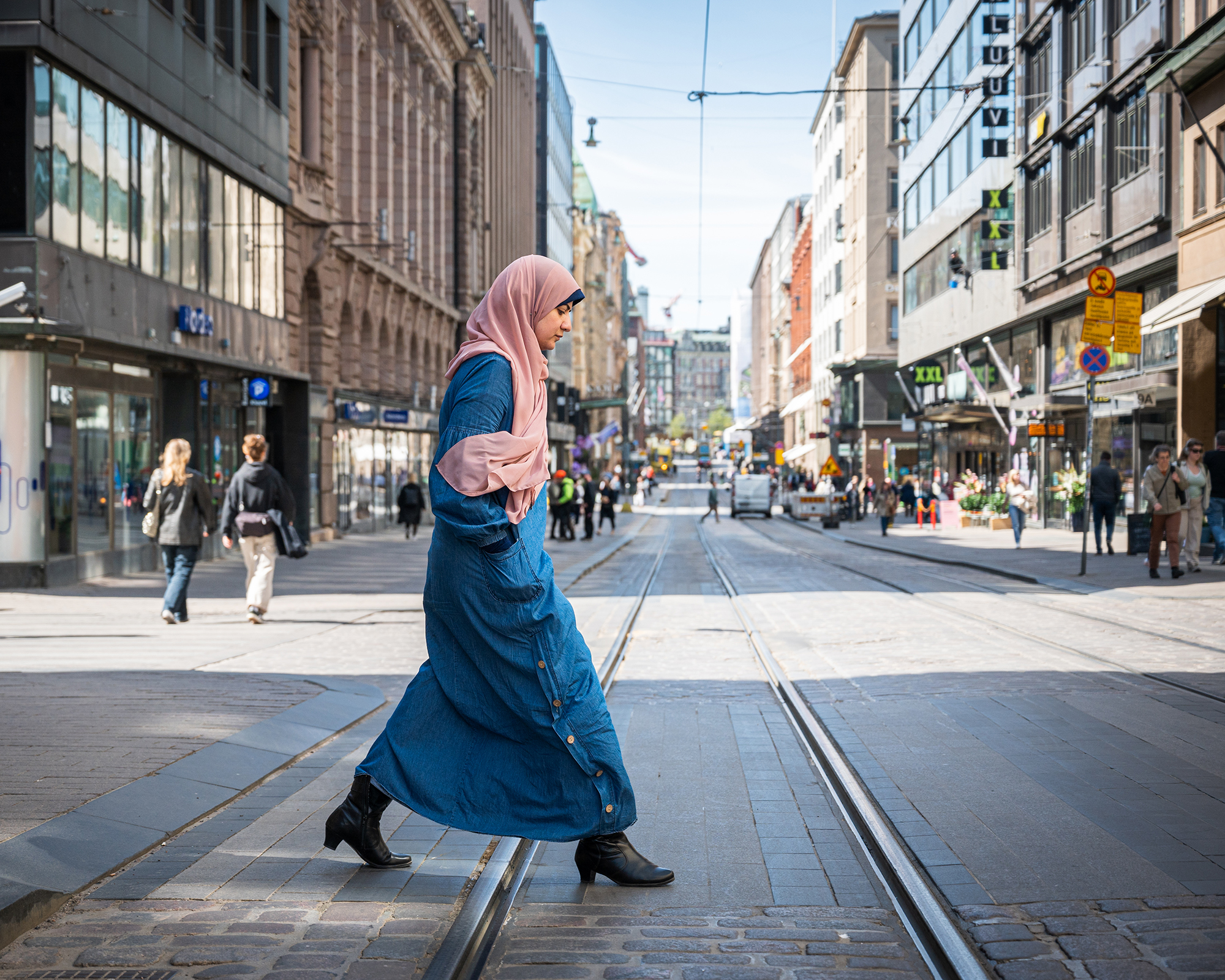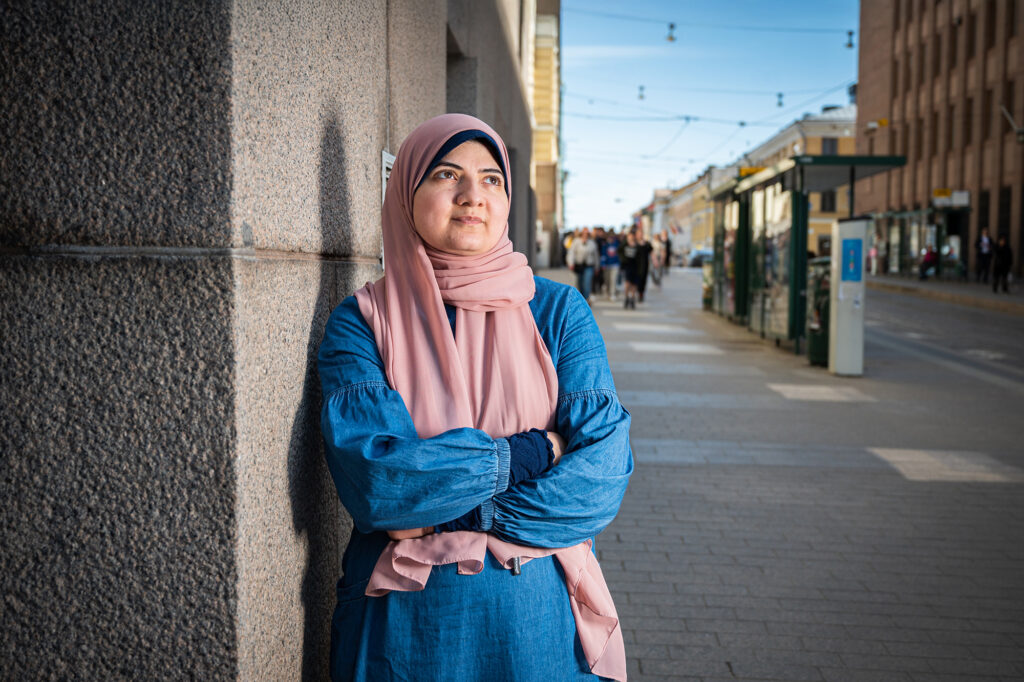Hijab, hope, and hard work: stories from Arab women in Finland

Despite cultural and professional challenges, Arab women in Finland continue to carve their own paths.
Summer Ashraf Abounar
Sercan Alkan
Published 23.05.2025 at 12:45
Updated 03.06.2025 at 7:18
اقرأ المقال باللغة العربية <<<
Finding work in a new country is never simple. Even though nearly 50 percent of third-country migrant women in Finland hold higher education degrees, only about 40 percent were employed in 2020 – compared to 72 percent of Finnish women – according to a 2022 study by the European Migration Network in Finland. Third country migrants are people from countries outside the European Union.
For Arab women in Finland, finding a place in the workforce often comes with extra hurdles. Some face cultural or religious bias. Others feel they need to prove themselves again and again, even when they are highly educated. But there are also stories of strength, support, and success. In this article, three Arab women share their experiences of working, studying, and rebuilding their careers in Finland.
“I had to start from zero”
Mahy Daoud, a pharmacist from Egypt, came to Finland over 13 years ago. Despite her degree, she had to start over. She studied Finnish and trained as a pharmacy assistant through a vocational program.
“I applied to pharmacies independently, but no one accepted me. One owner told me I looked strange because of my hijab,” Daoud recalls.
With support from her language school, she eventually found a more welcoming pharmacy for her training.
Language was a barrier at first—especially speaking—but practicing at work, watching Finnish television, and joining conversations helped.
“It takes time, but language skills do get better,” she says.
Balancing faith and work hasn’t always been easy. Daoud prays during coffee breaks, which shortens her rest time. Some employers have initially doubted her skills.
“They thought I wasn’t educated. But they changed their minds when they saw how hard I have worked.”
Now, she is pursuing degree recognition through university courses.
“Studying in Finnish is hard, but I keep going. My pharmacy degree from Egypt was not fully accepted, so I’m repeating some courses.”
Daoud hopes to inspire other immigrant women.
“Don’t give up. Learn Finnish, stay open to different paths, and trust yourself.”
“Always ready to prove myself”
Tahani Al Dahdouh is a Palestinian postdoctoral researcher at the Tampere Institute for Advanced Study. She came to Finland to pursue her doctoral studies in educational sciences and has since built a strong academic background. She is currently working on a research project focused on higher education in conflict zones. Even with impressive qualifications, her career path has not been easy.
“Academic work is competitive for everyone,” she says.
“But for Arab women, there are extra challenges. You need language skills, social networks, and cultural understanding.”
For Al Dahdouh, her Palestinian background also currently creates a personal barrier living in Finland.
“What makes me feel isolated and alone at times is the fact that I live here while my thoughts are constantly with Palestine and the genocide happening in Gaza,” she shares.
According to Al Dahdouh, this inner conflict adds a personal, identity-based layer to the challenges of integration, even if it doesn’t show directly at work.
Al Dahdouh uses English at work, but many teaching or grant opportunities require fluent Finnish. This limits her access. Most academic jobs are also short-term.
“You’re always applying for the next role,” she says. “It’s like being on alert all the time.”
Al Dahdouh also highlights a structural issue that she believes needs to be addressed in the system.
“I believe Finland’s policies do support the employment of immigrant women, but mostly in fields that locals avoid,” she says.
“Many of my highly educated friends, including engineers and dental assistants, end up working as practical nurses (lähihoitaja), because the integration courses often focus on these specific jobs.”

Al Dahdouh herself has faced rejection. Once, she was placed on a waiting list and didn’t expect to get the job. Then she received an email—a spot had opened up.
“That moment brought me hope again,” she says.
Al Dahdouh credits her husband, supervisors, and a supportive academic environment for helping her continue.
“The university promotes inclusion. My supervisors believed in me. That made a big difference.”
According to Al Dahdouh, even with strong skills, immigrant women need persistence to succeed.
“They didn’t know me, but now we’re friends”
Eman Kemmal, from Iraq, has lived in Finland since 2013. She works in the medical laboratory field and graduated at the top of her class during her vocational studies in Finland. With the support of her teacher, she landed a temporary position at the Finnish Institute for Health and Welfare (THL).
“It’s a field where accuracy, trust, and confidentiality are essential,” she says.
“That’s why it took time for my colleagues to get to know me and feel comfortable working closely together. After six months, we became close.”
Kemmal describes her experience at THL as positive.
“They judged me based on my work and ethics, not my background.”
During her time there, she felt valued and appreciated. Still, she understood that to keep advancing, she needed to continue her education.
After completing additional studies at Metropolia University to validate her degree in biology, re-entering the job market has proven challenging.
Currently, she is preparing to begin a new training placement at Peijas Hospital in Vantaa as a bioanalytical trainee, as part of her qualification recognition process, an opportunity she hopes will open more doors.
She encourages others to go straight to degree recognition rather than starting over.
“If your degree is from your home country, try to validate it first.”
Kemmal also believes in staying authentic while adapting.
“Be open. Respect the culture. But stay true to who you are.”
Edited on 03.06.2025 at 19:18: The word “universities” in the photo caption was replaced with “workplaces”.
Tips for Arab Women Seeking Work in Finland
Mahy Daoud, Tahani Al Dahdouh and Eman Kemmal share their advice for finding employment in Finland:
– Learn Finnish early — language is key.
– Try to get local training or an internship.
– Ask your teacher or mentor for a recommendation.
– Apply for degree recognition (not just new degrees).
– Build relationships at work, even small talk helps.
– Don’t be afraid to ask for support or small adjustments at work such as flexible hours or language assistance.